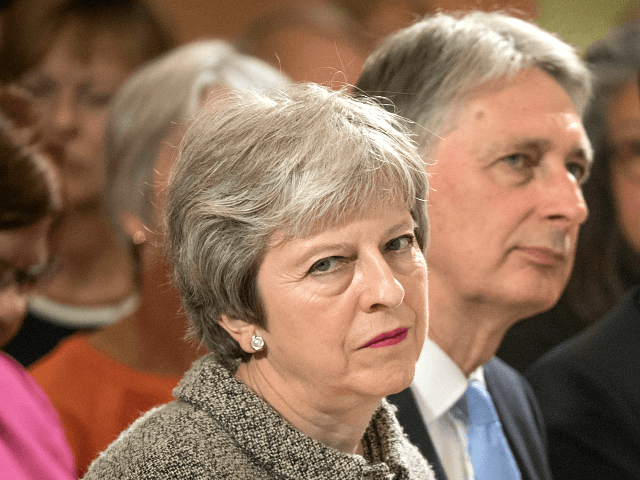Theresa May is set to urge the EU to drop its intransigence over changes to the proposed Withdrawal Agreement with the EU — as Chancellor Philip “Remainer Phil” Hammond warns Leave supporters that rejecting the deal may lead to an even weaker form of Brexit.
The Prime Minister’s proposed Brexit deal does not actually finalise a future partnership with the European Union, but merely buys her government a “transition” period in which the United Kingdom will essentially remain a non-voting EU member-state at the cost of an estimated £39 billion.
Most contentiously, the deal envisions a fallback “backstop” relationship if a deal is not secured by the end of this transition and an extension to it is not agreed, which would see the EU effectively annex the British province of Northern Ireland for customs purposes and the mainland Great Britain incorporated into an EU-controlled “single customs territory” — which it could not leave without the EU’s permission.
The Government has been seeking concessions on the backstop since MPs heavily rejected the deal some weeks ago, but the EU is so far refusing the make concessions — prompting Mrs May to plea for compromise ahead of a second parliamentary vote on March 12th.
“Just as MPs will face a big choice next week, the EU has to make a choice too. We are both participants in this process,” she will say at a speech in Grimsby on Friday.
“It is in the European interest for the UK to leave with a deal. We are working with them but the decisions that the European Union makes over the next few days will have a big impact on the outcome of the vote.”
Meanwhile, however, the ad hoc leader of the anti-Brexiteers in Cabinet, Chancellor of the Exchequer Philip Hammond, is warning Brexiteer MPs that if they do not swing behind the Prime Minister’s deal they will likey be presented with an even weaker form of Brexit, of the sort favoured by the left-wing opposition parties which have largely ceased making any pretence of respecting the people’s vote to Leave the European Union in 2016.
“I hope [Attorney-General Geoffrey Cox and Brexit Secretary Stephen Barclay] will come back with an offer that my colleagues on the Brexit wing of the party will consider very, very carefully in the context of the real situation that we are in,” Hammond warned — rather implying that he and possibly the Government large were not Brexit supporters themselves, despite standing on a Brexit manifesto in 2017.
“The Labour party has been talking for a long time about the idea of a customs union grafted onto the PM’s deal. Those of my colleagues who feel very strongly against that proposal need to think very hard about the implications of voting against the Prime Minister’s deal next Tuesday, because we will then be in unknown territory where a consensus will have to be forged across the House of Commons and that will inevitably mean compromises being made,” he added.
The clear implication is that if Brexiteers vote down the deal, seen by most as not delivering a “real” Brexit given the huge swathes of policy it would leave the EU in control of, the alternative would not be a clean break with the bloc, but a new deal tying the United Kingdom to it even closer.
Many parliamentarians are now unwilling to countenance even an ultra-soft Brexit of the sort the Chancellor is describing, however, with a growing number of MPs backing Remain diehards’ demands to re-run the 2016 referendum.

COMMENTS
Please let us know if you're having issues with commenting.